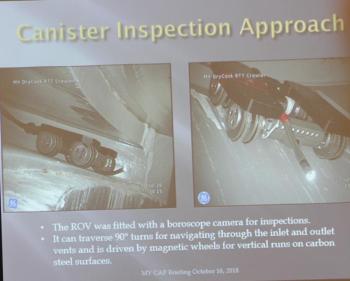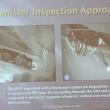Maine Yankee CAP hears about cannister checks, removal updates
The Maine Yankee Community Advisory Panel on spent nuclear fuel storage and removal heard information Tuesday about a canister inspection project that needs to be completed by November 2020, concerns about agencies pulling back from regional partnerships, and lack of support on Capitol Hill to move forward on a nuclear material removal plan.
Canister Relicensing Project Manager Paul Plante discussed how one canister was inspected in preparation for the full licensing project. Plante said tiny robots that could move between the outer cask and the inner cask were put into the canisters looking for damage or stress. Also tested was the temperature at different places on the canister, and the radiation detected at different levels. Plante said the small canister was picked because the smaller canisters are more likely to be cool enough for condensation to form, allowing for greater chance of salt accretion and deterioration due to water between the outer and inner casks.
Except for some sloughing off of material at the bottom of the cask, Plante was pleased with how the canisters were holding up. The robots found the greatest heat and radiation in the middle of the canister as expected, while the top and bottom were quite cool and did not emit as much radiation. This boded well for the integrity of the greater cask, and if the selected canister was representative of the rest, he was confident in the casks’ safety.
State Nuclear Safety Inspector Pat Dostie said he attended the Northeast High-Level Radioactive Waste Transportation Task Force in Portland in November 2017. However, the Department of Energy (DOE) had stopped all participation in regional meetings, canceled the 2018 Transportation Core Group meetings, and is focused only on national events such as the National Transportation Stakeholders Forum in June. He said this brought virtually all activity with the six ad hoc groups to a standstill. He was concerned state funding to the annual and regional meetings may be cut.
Director of Public and Governmental Affairs Eric Howes raised concerns about the longstanding impasse between the House and Senate over comprehensive nuclear waste policy reform. There was no funding for either Yucca Mountain or consolidated interim storage (CIS) facilities in the fiscal year 2019 Energy and Water Development Appropriations bill approved by Congress and signed by President Donald Trump in September. Multiple other nuclear waste bills, including one cosponsored by U.S. Sen. Angus King, I - Maine, and one cosponsored by U.S. Reps. Chellie Pingree, D - Maine, and Bruce Poliquin, R - Maine, have not yet moved forward.
President Trump’s FY 19 budget request proposed $120 million for DOE to resume the Yucca Mountain application and to establish strong CIS capability. Work continues on standards for railroads involving train cars that can carry high level radioactive material. Known as the Atlas Railcar Project, it is scheduled to be completed in 2022.
Event Date
Address
United States































